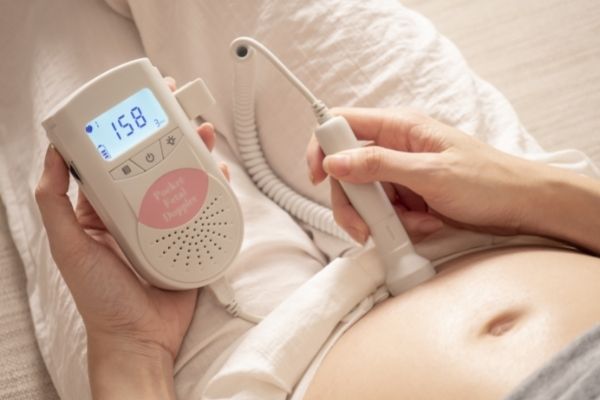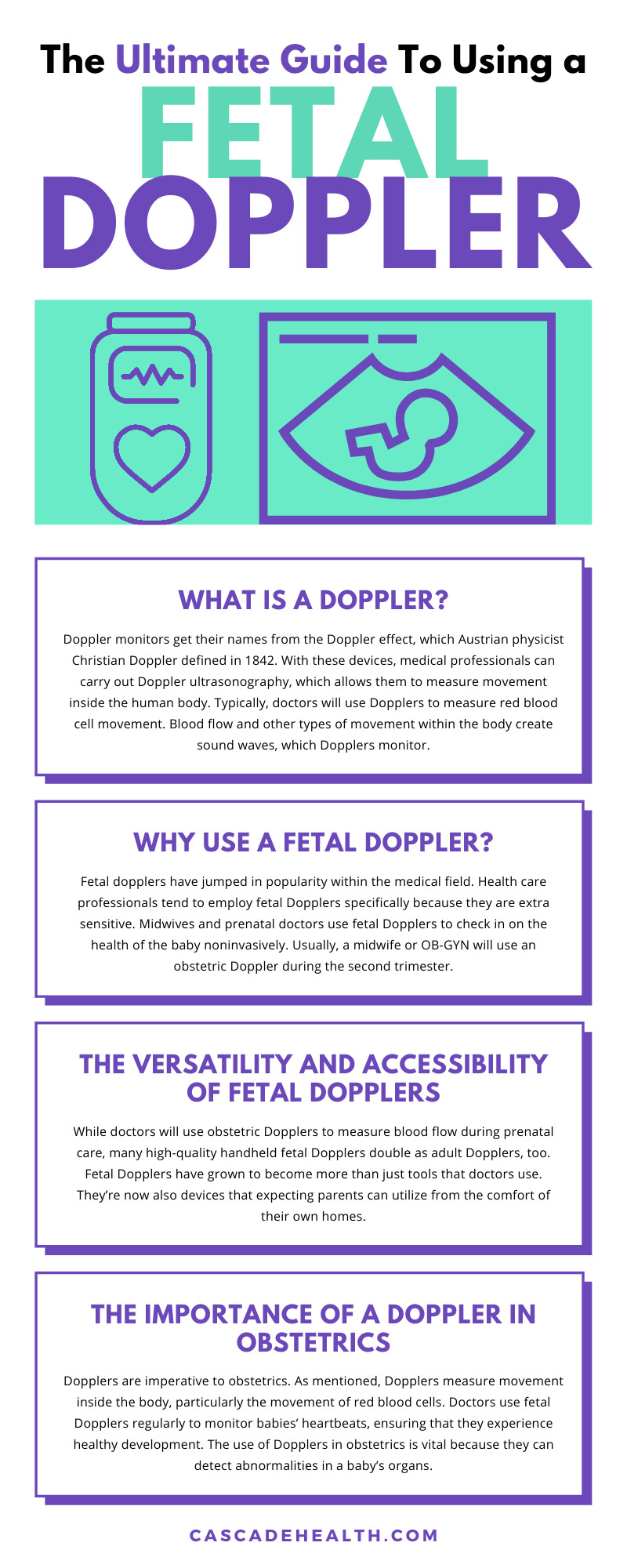The Ultimate Guide To Using a Fetal Doppler

To monitor a pregnancy, healthcare professionals employ various equipment and devices. An assortment of trusty health care tools allows midwives and OB-GYNs to stay updated on the health and safety of the expecting mother and baby. Regular checkups throughout the duration of the pregnancy enable doctors to catch any complications early and create the best form of care for each of their patients. Among prenatal healthcare professionals’ arsenal of high-grade medical devices are handheld fetal Dopplers. In Cascade Health Care’s ultimate guide to using a fetal Doppler, we cover what fetal Dopplers are, the different types, why they’re so important to obstetrics, and how to use them.
What Is a Doppler?
Doppler monitors get their names from the Doppler effect, which Austrian physicist Christian Doppler defined in 1842. With these devices, medical professionals can carry out Doppler ultrasonography, which allows them to measure movement inside the human body. Typically, doctors will use Dopplers to measure red blood cell movement. Blood flow and other types of movement within the body create sound waves, which Dopplers monitor.
Why Use a Fetal Doppler?
Fetal dopplers have jumped in popularity within the medical field. Healthcare professionals tend to employ fetal Dopplers specifically because they are extra sensitive.
Midwives and prenatal doctors use fetal Dopplers to check in on the health of the baby noninvasively. Usually, a midwife or OB-GYN will use an obstetric Doppler during the second trimester.
Because fetal Dopplers are extra sensitive, they may be able to pick up an unborn baby’s heartbeat as early as 8 to 12 weeks of pregnancy. It’s common for prenatal care professionals to take a Doppler test at each checkup of the baby’s health.
The Versatility and Accessibility of Fetal Dopplers
While doctors will use obstetric Dopplers to measure blood flow during prenatal care, many high-quality handheld fetal Dopplers double as adult Dopplers, too. Fetal Dopplers have grown to become more than just tools that doctors use. They’re now also devices that expecting parents can utilize from the comfort of their own homes.
Being Mindful of Doppler Use at Home
Individuals should not use over-the-counter fetal Dopplers to replace prenatal checkups at the doctor’s office. But they can utilize them to provide more routine check-ins on their baby’s heartbeat. Over-the-counter medical devices are not likely to be as high-grade as the ones you see at your health care provider’s facility. Therefore, it’s important to continue receiving Doppler tests from a medical professional.
Tips for Using an At-Home Fetal Doppler Successfully
Should you plan to utilize an at-home fetal Doppler throughout the duration of your pregnancy, you should understand that there are a few tricks for acquiring an accurate read. Of course, the accuracy of your at-home test will rely heavily on the quality of your Doppler. But we’ve also included steps in the ultimate guide to using a fetal Doppler below to assure that you use the device correctly. Here’s what to do.
- Verify that the Doppler has working batteries.
- Rest in a comfortable position.
- Adjust your shirt and pants to expose your lower belly.
- Place sonogram gel, aloe vera, or an alternative lotion onto your lower belly for easy and comfortable Doppler maneuvering.
- Turn your Doppler on and begin moving it around your lower belly very slowly. It may take a while to hear a heartbeat. Try moving your Doppler lower if you’re having a difficult time finding your baby’s heartbeat.
Considerations When Using a Fetal Doppler at Home
You may find that using a fetal Doppler at home requires some trial and error. Cascade Health Care has outlined some considerations to think about when using a fetal Doppler at home. Recognizing certain faults of these at-home devices can save you from spending lots of time and money on resources without getting accurate results.
- Not all Dopplers are equal. If you purchase fetal Dopplers online, verify that they are medical grade. Some manufacturers sell low-quality Dopplers simply for profit, regardless of how accurate their results are.
- In some cases, you can hear a baby’s heartbeat via Doppler as early as nine weeks into the pregnancy. However, this isn’t the case with every pregnancy. You may need to wait until your second trimester. You’re most likely to get an accurate reading with an at-home Doppler test around the 13- to the 28-week mark of your pregnancy.
- You have a heartbeat, too! When focused on performing an ultrasound on yourself, it can be difficult to distinguish your arteries’ pulses and your baby’s heartbeat. As a reminder, your baby’s heartbeat will sound much faster than yours.
- You may find it extra challenging to get a reading of your baby’s heartbeat if your child is in a position that makes getting an accurate ultrasound more difficult.
- Some Dopplers are more advanced than others. If you’re having a hard time using the Doppler, it may be because the device requires formal medical training for proper use.
The Importance of a Doppler in Obstetrics
Dopplers are imperative to obstetrics. As mentioned, Dopplers measure movement inside the body, particularly the movement of red blood cells. Doctors use fetal Dopplers regularly to monitor babies’ heartbeats, ensuring that they experience healthy development.
The use of Dopplers in obstetrics is vital because they can detect abnormalities in a baby’s organs. Doctors use these devices to check whether the baby’s brain, umbilical vein, and arteries have healthy blood flow. Dopplers may detect blockages, narrowing, or leaking in a blood vessel, prompting immediate, life-saving care.
Doppler tests can also identify healthy or abnormal placental circulation, which is essential to a baby’s development. Catching health adversities in the early stages of a pregnancy maximizes both the baby’s and mother’s health and safety.
Health Care Resources Made for You
Cascade Health Care provides a wide variety of medical care equipment and supplies. We have an expansive collection of midwifery and at-home birth devices and supplies to promote the health and safety of mothers and children. You’ll find that we offer quite the range of high-grade medical Dopplers alone. Contact a member from our dedicated customer service team today to help you find the health care materials you or your healthcare facility needs.

Recent Posts
-
Tips for Maintaining Milk Supply When Returning to Work
Returning to work after welcoming a baby introduces logistical, emotional, and physiological challen
-
9 Items EMTs Should Have Stocked for Prehospital Deliveries
Prehospital deliveries rarely announce themselves with perfect timing. One minute you take a routine



